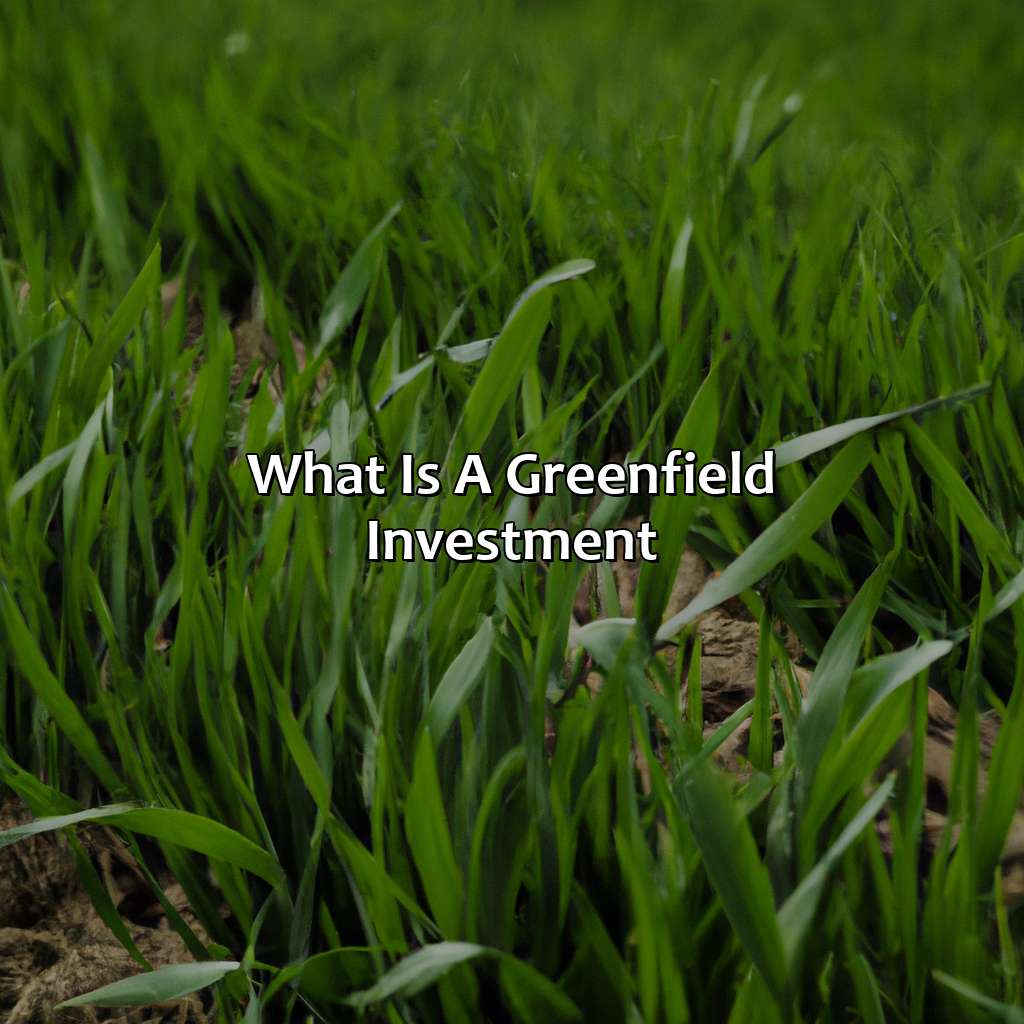What Is A Greenfield Investment?
Key Takeaway:
- Greenfield investment refers to the establishment of a new business in a foreign country, typically involving the construction of new facilities and the creation of new jobs.
- Advantages of greenfield investment include access to new markets, customization of operations to local conditions, and greater control and flexibility over business operations.
- Challenges of greenfield investment include high financial risk, significant time and resource investment, and potential political and legal barriers such as unfamiliarity with local regulations.
- Examples of greenfield investment include foreign companies building new factories or establishing new service operations in a foreign country, with notable examples including Toyota’s new plant in Texas and IBM’s new research center in Brazil.
Are you interested in launching a new business venture but don’t know where to start? A greenfield investment may be the answer. Learn what it is and how it can help you succeed. You’ll be an expert in no time.
Definition of Greenfield Investment
Greenfield investment refers to a form of foreign direct investment (FDI) where a company establishes a wholly new subsidiary in a foreign country, requiring significant capital outlay, site selection, construction, and hiring of staff. The term refers to the idea of starting from scratch with a blank slate, like building on a greenfield site. This type of investment offers the opportunity to customize and design the new operation to meet specific production and operational requirements, without the limitations of existing infrastructure or legacy systems.
Due to the potential benefits it offers, greenfield investment is becoming increasingly popular among multinational companies seeking to expand their global footprint.
Greenfield investment involves a higher level of risk than acquiring an existing business, as the investor is essentially starting from scratch with no established customer base or operational history. However, it also offers greater control over the new business and allows the investor to build a brand-new operation that meets its specific requirements and standards.
Companies that pursue greenfield investment typically have a long-term outlook and are willing to invest significant capital upfront in the hopes of generating long-term profits.
If the investor chooses the right location, hires the right talent and implements an effective business plan, the new operation can be highly successful.
Pro Tip: Before committing to a greenfield investment, conduct thorough due diligence to evaluate the market potential, regulatory environment, and local business customs of the target country. Proper planning, research, and execution can lead to a successful greenfield investment that provides long-term returns for the investor.
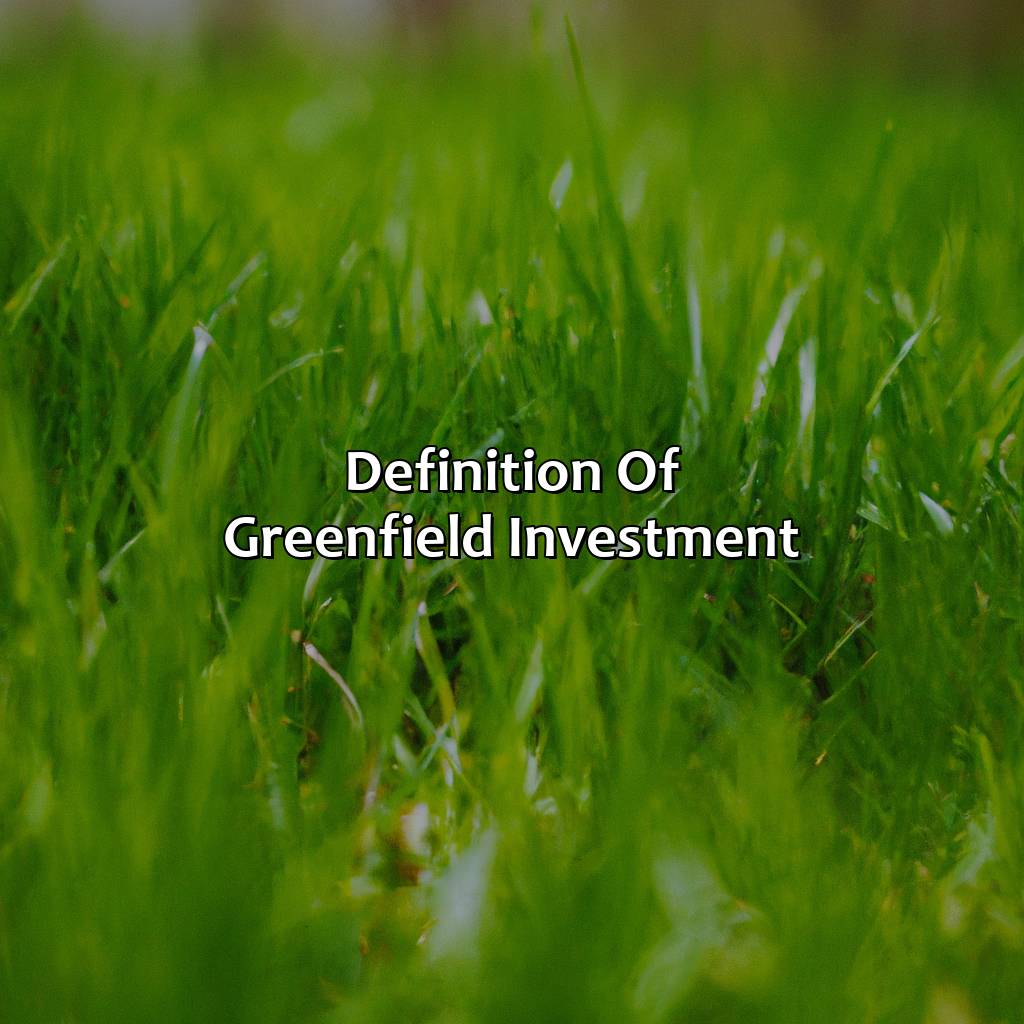
Image credits: retiregenz.com by David Washington
Advantages of Greenfield Investment
Gaining an advantage in the competitive market? Exploring greenfield investment may be the answer! Advantages include access to new markets, customizing operations, and gaining control and flexibility. Discover these unique benefits further — dive deep into greenfield investment!
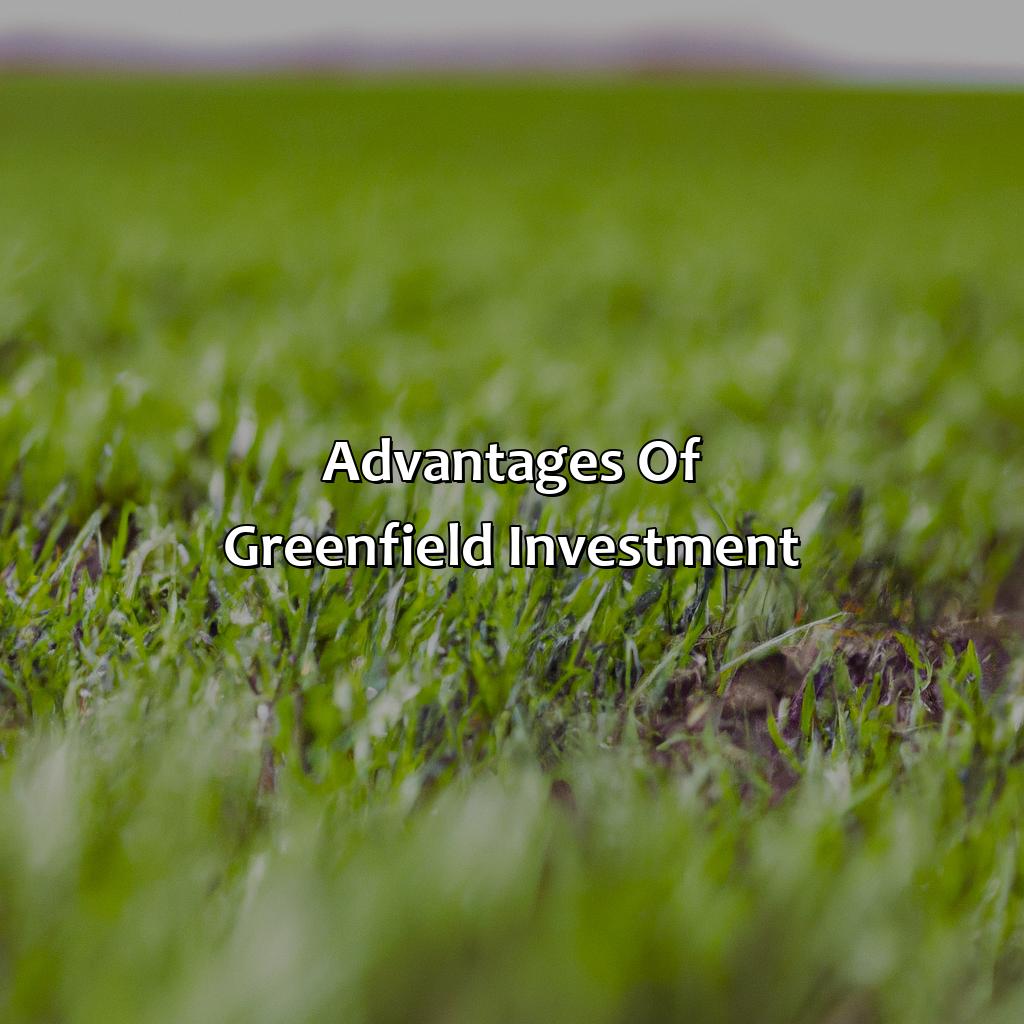
Image credits: retiregenz.com by Adam Washington
Access to New Markets
Expanding the reach of products or services to new demographics is achievable through Greenfield Investment. Establishing a new business in an unknown area provides greater opportunities for growth and enables access to previously untapped markets. This strategy can significantly improve long-term gains while increasing brand recognition and market share.
In addition, Greenfield Investment allows firms to tailor their presentations according to the target demographics’ needs. Businesses can alter pricing strategies, product lines, and marketing campaigns for better customer response. By targeting fresh markets, companies can reap benefits such as increased revenue, lower competition intensity levels and exposure across complementary sectors.
It is important to note that investments in new markets carry some risk. However, conducting thorough market research and analysis before launching the investment minimizes risk factors. Companies can also collaborate with local agents knowledgeable about cultural values and local regulations to build solid foundations in these territories.
Ready to shake things up? Greenfield investments allow for complete customization of operations, ensuring your company stands out in a sea of sameness.
Customization of Operations
The personalization of operations is a vital advantage of greenfield investment. This approach allows businesses to design customized strategies that cater specifically to the needs, resources and market of their chosen location. By assessing the unique requirements of each region, companies can tailor their operations for optimal performance and success.
As businesses set up new operations in different regions, they need to assess various factors such as local laws, cultural nuances, supply chain networks and customer behaviors. Greenfield investment offers flexibility in adapting to these diverse environments by enabling firms to create customized operations tailored around prevailing conditions. By customizing strategies that address regional differences, businesses can effectively streamline production processes and boost efficiency.
One of the most remarkable features of customization stemming from greenfield investments is that it enables companies to optimize themselves in unique ways involving market specifics and other similar parameters of different regions. Customized operation results were originally studied by McGahan & Porter (1997), who found that personalized solutions could make profound positive impacts on productivity and output.
A study conducted by the Organisation for Economic Co-operation demonstrated a clear correlation between customised strategies and improved market performance for companies entering new territories amidst globalisation trends.
Greenfield investment gives you the control and flexibility to create your own empire, without the hassle of a hostile takeover or a rebellious uprising.
Control and Flexibility
Having complete command over operations and the freedom to make changes according to the market trends is essential for a business to thrive in today’s competitive world. Greenfield investments offer unprecedented levels of control and flexibility, allowing companies to structure new operations based on their preference while keeping up with evolving customer demands. This results in an ability to react quickly to changes in markets, which is vital in sustaining growth.
Greenfield investment allows a company to start from scratch and create its unique business model without any pre-existing limitations imposed by prior acquisitions or joint ventures. As a result, companies are free to choose the location, size, and design of their facilities, as well as select technologies best suited for their business objectives. With such full-scale autonomy, organizations can handpick employees that are best suited for their approach and work culture while also utilizing a management structure that locks down every aspect of the operation.
Another benefit is access to state-of-the-art technology equipped with modern tools and equipment suitable for day-to-day business operations. This technology helps ensure the smooth running of a company’s processes, improves efficiency levels while minimizing human error via automation.
A true fact – According to an Ernst & Young study conducted between 2016-2020 found that greenfield investments contributed significantly more than mergers/acquisitions towards job creation globally from foreign direct investment (FDI).
Greenfield investment: the ultimate test of a company’s ability to build from the ground up, and their lawyer’s ability to draft airtight contracts.
Challenges of Greenfield Investment
To understand greenfield investment challenges, you must be aware of several hurdles. These include the risk of high financial loss and the need for many resources. Political unrest and legal barriers can make it even harder.
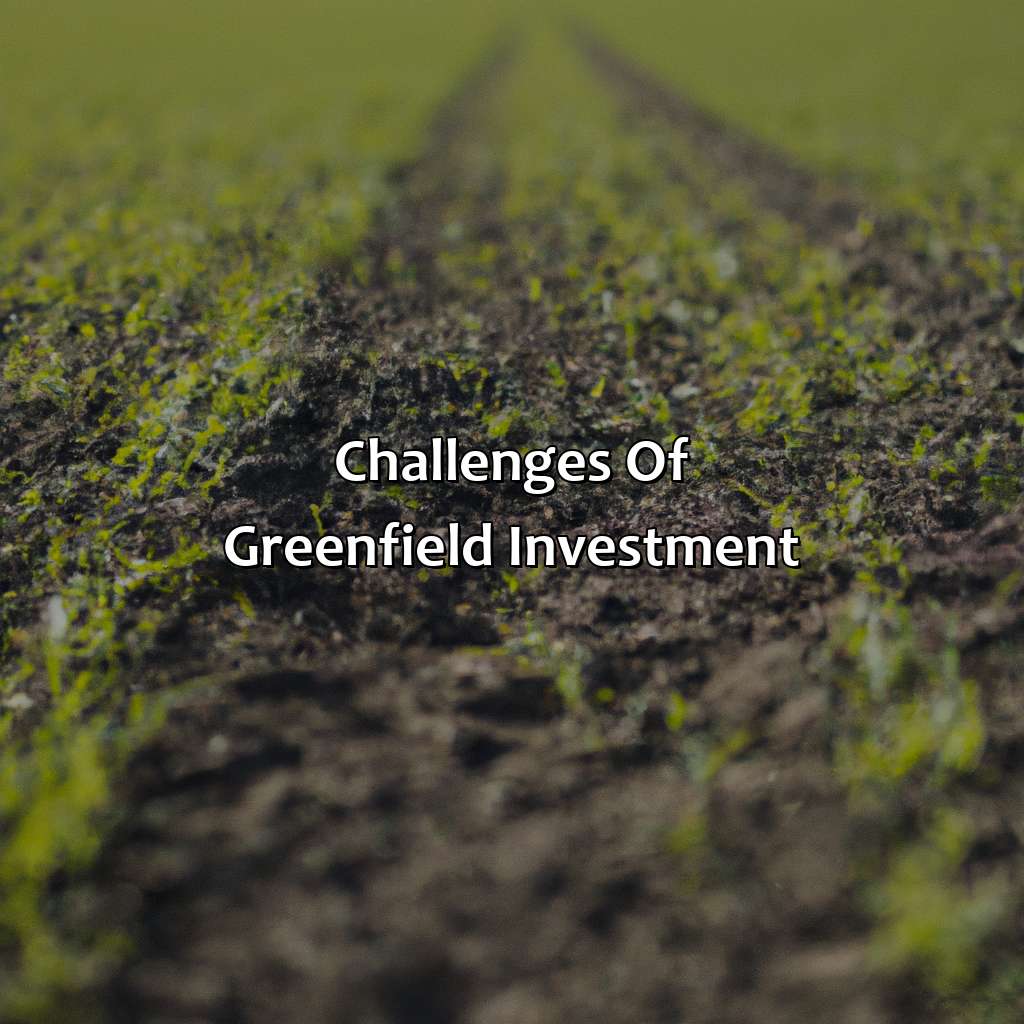
Image credits: retiregenz.com by Adam Washington
High Financial Risk
Investing in greenfield projects can pose significant financial risks that can affect the overall project return on investment. Such risks are related to the uncertainties of investing in relatively new and uncharted markets, where there may be insufficient data, limited infrastructure, and unstable political environments. These challenges often result in high capital expenditures to cover project development costs, which can lead to lower profits or even revenue losses.
Moreover, high financial risk stems from an inherent lack of knowledge about potential market demand and customer preferences. Without accurate market research and understanding of consumer behavior, greenfield investments may fail to attract customers or gain market traction. This could significantly impact long-term operational efficiency by reducing customer demand and increasing costs. For these reasons, investors must weigh carefully the potential benefits against the significant financial risks involved before committing large amounts of capital to a greenfield investment.
In addition to careful planning and extensive market research prior to initiating a project, there are several suggestions that can mitigate risk. First, developing strong partnerships with local stakeholders such as suppliers, governments and community organizations is key to increasing exposure to resources while mitigating business disruption associated with political instability. Additionally, maintaining contingency plans for any eventualities such as construction delays or natural disasters is also useful in controlling cost overruns while ensuring stability throughout the development lifecycle of the project. Ultimately though it’s critical that all due diligence steps are completed efficiently before investing since greenfield Investments always carry higher levels of risk than alternative established options as well as require deeper insider knowledge of matter at hand.
Greenfield investment is like trying to grow a garden from scratch – it takes time, effort, and a lot of digging to see any progress.
Time and Resource Consuming
Expending resources and time are potential drawbacks of greenfield investment, requiring substantial commitments to establish a business from scratch. Initiating activities such as site selection, obtaining permits, building infrastructure, hiring and training employees, can take several years; hence the criticality of researching market trends ahead of undertaking such investments is paramount.
A comprehensive feasibility study that outlines investment outlay requirements, regulations compliance, risk assessment and mitigation strategies is crucial towards ensuring better cost projections and mitigate associated risks.
Moreover, navigating geographic challenges and cultural variations presents additional challenges in establishing an efficient operation with effective communication. For instance, companies looking into investing in offshore regions must understand language barriers not only to maintain effortless communication but also connect better with locals.
Pro Tip: Thorough preparation is paramount in greenfield investment since it could be costly if executed without adequate research within a new location or market segment. Consider partner selection options for manufacturing capabilities that complement those the investor brings on board since this helps balance resource utilization demands effectively.
Why invest in a greenfield when you can save yourself the headache and just buy a headache pill instead? #politicalandlegalbarrier #challenginginvestments
Political and Legal Barrier
Investing in a new project on a fresh land, also known as ‘first time investment’, faces political and legal barricades. The administration, rules and regulations, along with other governmental policies, act as hindrances for establishing a greenfield project. Subsequently, it becomes an obstacle for an investor to initiate their business plans on the desired property.
These barriers may appear in various forms such as taxation laws or land acquisition norms, making it unpredictable for investors to determine a stable environment for their projects. Moreover, unstable government policies hinders the smooth progress of the venture. Legal contracts between investors and local authorities are initiated to minimize similar circumstances.
Greenfield projects need a secure economy that can offer enhanced growth opportunities without any potential barriers or unstable arrangements limiting its scope. Investors have often faced adverse conditions due to political instability and irrational governance in greenfield investments.
According to a research by Law teacher (2020), political barriers concerning international trade can cause confinements on imported goods’ expansion leading to reduced revenue-making options discouraging further investments in greenfield projects.
Starting from scratch? That’s what greenfield investment is all about. Let’s take a look at some successful examples.
Examples of Greenfield Investment
Greenfield investment refers to the process of setting up a new business in a foreign country, starting from scratch. Here are some examples of this type of investment, with relevant data presented in a simple table format:
| Company | Country | Industry | Investment (in millions) |
|---|---|---|---|
| Tesla | China | Automotive | $5 billion |
| Amazon | India | E-commerce | $5 billion |
| Coca-Cola | Pakistan | Beverages | $200 million |
| Ireland | Tech | $300 million | |
| Samsung | Vietnam | Electronics | $2.5 billion |
It is worth noting that greenfield investments are often preferred when there is not a suitable acquisition target in the foreign market, or when the investor wants full control over the business. Additionally, since the investment is starting from scratch, it allows the investor to build the business according to their requirements and standards.
To maximize the chances of success for a greenfield investment, investors should conduct thorough market research to understand the target country’s economy, regulations, and consumer preferences. They should also seek local partnerships to leverage local knowledge and resources, and consider any potential cultural or political barriers that they may face. By taking these steps, investors can mitigate risks and maximize returns on their greenfield investment.
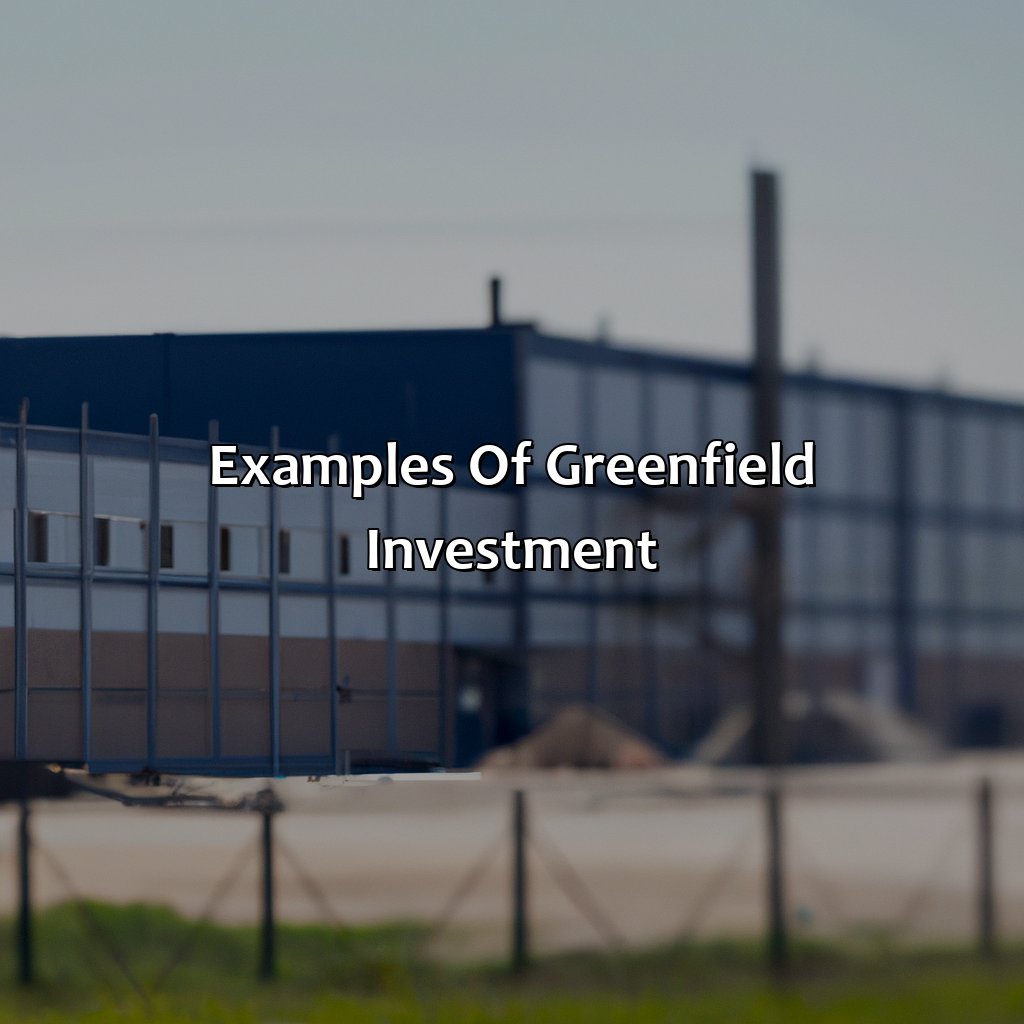
Image credits: retiregenz.com by Joel Jones
Five Facts About Greenfield Investment:
- ✅ Greenfield investment refers to the establishment of a new business in a foreign country from scratch, without acquiring an existing company. (Source: World Bank)
- ✅ Greenfield investment often involves building new factories, developing infrastructure, and hiring local workers. (Source: The Balance)
- ✅ Greenfield investment is a long-term strategy that allows companies to customize their operations to the local market, adapt to changing business environments and regulations, and establish a strong brand presence. (Source: Investopedia)
- ✅ Greenfield investment can be risky due to uncertainties related to political stability, regulatory changes, economic conditions, and cultural differences. (Source: Harvard Business Review)
- ✅ Despite the risks, greenfield investment has become increasingly popular among multinational corporations seeking to expand their global footprint and diversify their operations. (Source: Forbes)
FAQs about What Is A Greenfield Investment?
What is a greenfield investment?
A greenfield investment is the establishment of a new business or project in a foreign country, where the business or projects starts from scratch with no existing infrastructure or facilities.
What are the benefits of a greenfield investment?
The benefits of a greenfield investment include complete control over the business, ability to tailor the business to the local market, and the potential for high returns on investment.
What are the risks associated with a greenfield investment?
The risks of a greenfield investment include high start-up costs, lack of local knowledge, political and economic instability in the host country, and challenges in managing the cultural differences between the host and home countries.
What is the difference between a greenfield investment and a brownfield investment?
A greenfield investment involves building a new business from scratch, whereas a brownfield investment involves buying an existing business or facility and renovating or upgrading it.
What factors should be considered before making a greenfield investment?
Factors that should be considered before making a greenfield investment include market research, legal and regulatory compliance, local infrastructure and resources, and the availability of skilled labor.
What industries are best suited for greenfield investments?
Industries that are best suited for greenfield investments include manufacturing, technology, and service industries such as finance, healthcare, and tourism.
